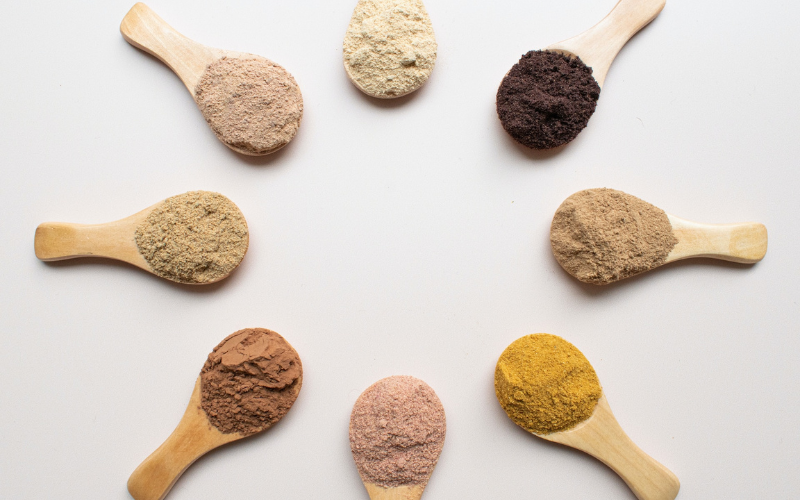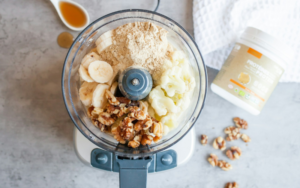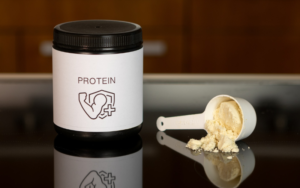Table of Contents
What are protein powders?
Protein powders have gained immense popularity in recent years, and for a good reason. They are a convenient and efficient way to increase your protein intake, whether you’re an athlete looking to build muscle, a fitness enthusiast aiming to recover faster, or someone seeking to meet their daily protein requirements.
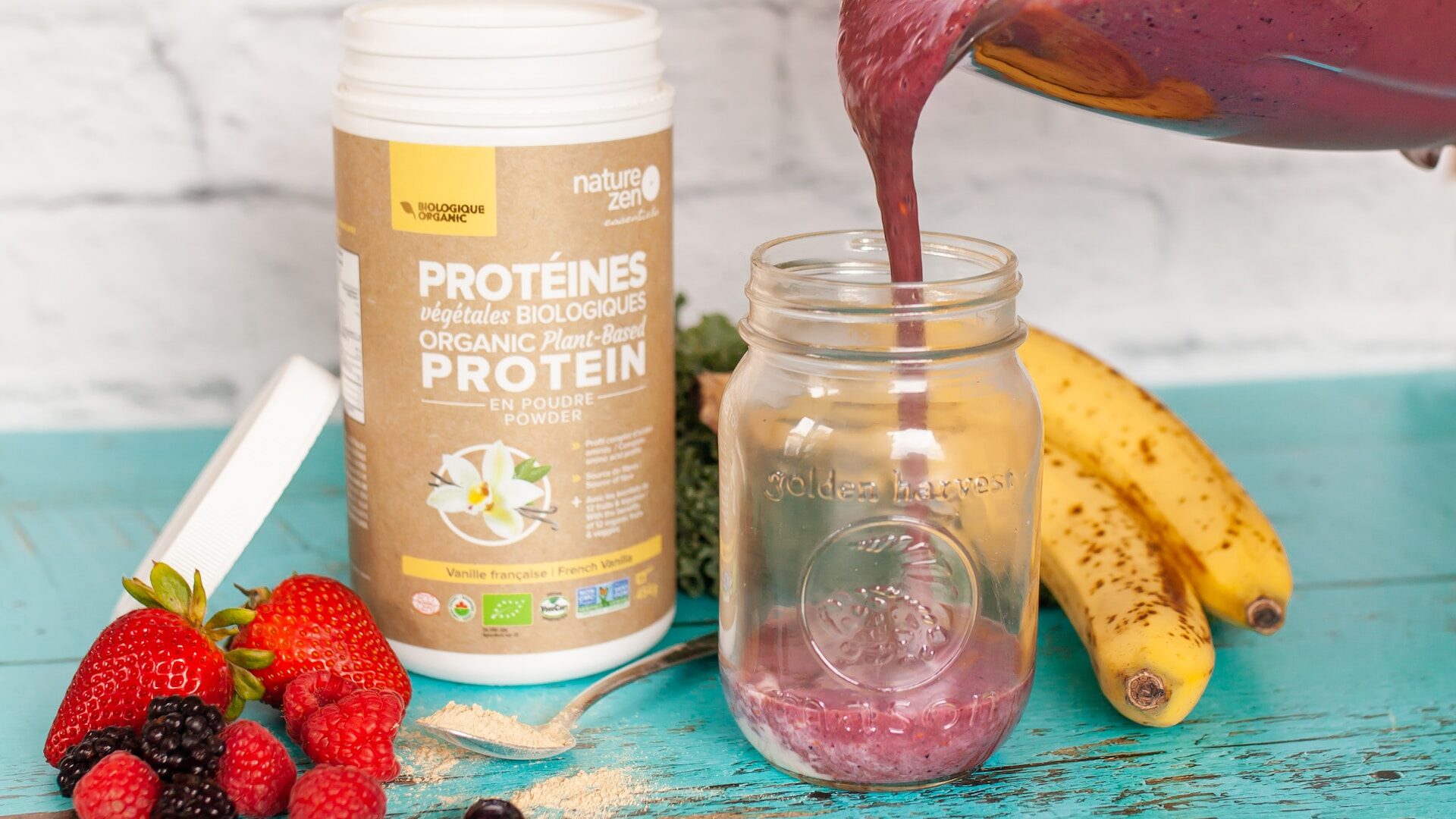
In this guide, we’ll explore the seven best types of protein powder available in the market, helping you make informed decisions about your nutritional choices.
Now, let’s dive into the world of protein powders, starting with one of the most famous options:
1. Whey protein
In terms of protein supplementation, whey protein stands out as one of the most popular and effective choices. It’s derived from milk during cheese-making process and is known for its high-quality protein content. Whey protein isn’t only rich in essential amino acids, but also offers numerous health benefits. There are three primary forms of whey protein:
Whey Concentrate
Whey concentrate is the most common and budget-friendly form of whey protein. It contains a lower percentage of protein (generally around 70-80%) compared to the other forms of protein, but retains more of the beneficial nutrients found in whole whey.
Pros of Whey Concentrate:
- Contains bioactive compounds that help the immune system.
- Offers a more balanced nutritional profile due to the higher fat and carbohydrate content.
Whey Isolate
Whey isolate is processed further to remove most of the fat and lactose, resulting in a whey that is 90% or more pure protein. The high protein content makes it an excellent choice for those seeking a higher protein content with minimal additional calories.
Pros of Whey Isolate:
- Extremely high protein content with minimal fat and carbohydrates.
- Ideal for individuals with lactose intolerance.
Whey Hydrolysate
Whey hydrolysate is predigested, meaning it has undergone partial hydrolysis to break down proteins into smaller peptides. Due to this proces whey hydrolysate is easier to digest, making it a suitable choice for individuals with sensitive stomachs or allergies.
Pros of Whey Hydrolysate:
- Rapid absorption due to pre-digestion, making it an excellent post-workout choice.
- Less likely to cause allergic reactions.
Each form of whey protein has its own unique advantages, so your choice may depend on your dietary preferences, fitness goals, and any dietary restrictions you may have.
Read more about The 3 types of Whey Protein here.
2. Casein protein
Casein protein is another valuable protein source that’s derived from milk. Unlike whey protein, which is quickly absorbed by the body, casein is known for its slow digestion and prolonged release of amino acids. This unique characteristic makes it an excellent option for situations, such as before bedtime or as a meal replacement.
Key facts about casein protein:
Slow Digestion and Sustained Release
Casein forms a gel-like substance in the stomach when consumed. This gel gradually releases amino acids into the bloodstream over several hours, providing a steady supply of nutrients to your muscles.
High in Essential Amino Acids
Casein is rich in essential amino acids, including leucine, which plays a crucial role in muscle protein synthesis and recovery.
Beneficial for Muscle Preservation
Due to its slow-release nature, casein is often recommended as a nighttime protein source. It can help prevent muscle breakdown during extended periods without food, such as overnight fasting.
Excellent for Satiety
The slow digestion of casein may also help you feel full for a extended period, making it an option for those looking to manage their appetite and calorie intake.
Lactose Content
While casein protein is generally well-tolerated, it contains lactose. If you’re lactose intolerant, consider a lactose-free protein source or a lactase enzyme supplement to aid digestion.
Incorporating casein protein into your diet can be especially beneficial when your goal is to support muscle recovery and growth over an extended period. However, it’s essential to remember that no single protein source is a one-size-fits-all solution! Your choice should align with your specific fitness goals and dietary preferences.
3. Egg protein
Egg protein is a versatile and highly nutritious protein source derived from eggs, considered as one of nature’s perfect foods.

This protein powder is created by separating egg whites from the yolks, then drying and processing the whites into a powder form. Here’s what you need to know about egg protein:
A Complete Protein Source
Egg protein is often considered a gold standard in protein quality. It is a complete protein. It contains all the essential amino acids your body needs for various physiological functions, including muscle building and repair.
Low in Fat and Carbs
Egg protein is an excellent choice for those who want to boost their protein intake without consuming extra fat or carbohydrates. It’s naturally low in both, making it suitable for a wide range of dietary plans.
High Biological Value
The biological value of a protein measures how efficiently your body can use it for protein synthesis. Egg protein boasts a high biological value, indicating that it is readily absorbed and utilized by your body.
Rich in BCAAs
Branched-chain amino acids (BCAAs) are considerd one of the Best Supplements For Muscle Growth. BCAAs, which include leucine, isoleucine, and valine, are vital for muscle growth and repair. Egg protein is naturally abundant in BCAAs, making it an ideal choice for athletes and bodybuilders.
Lactose-Free
Unlike some of the other protein sources, egg protein is naturally lactose-free, making it suitable for individuals with lactose intolerance or dairy allergies.
Versatile in Cooking
Egg protein powder can be used to make protein shakes, but also in cooking and baking. It adds a protein boost to recipes without altering the flavor significantly.
Whether you’re looking to build muscle, support weight management, or increase your protein intake, egg protein can be a valuable addition to your nutrition plan. However, as with any protein powder, it’s essential to choose high-quality products from reputable brands to ensure purity and effectiveness.
4. Pea protein
Pea protein has gained popularity as a plant-based protein source, particularly among individuals who follow vegan or vegetarian diets. Derived from yellow split peas, pea protein offers several advantages:
High-Quality Plant-Based Protein
Pea protein recognized for its high protein content and is considered one of the most complete plant-based protein sources. It contains all essential amino acids although it’s slightly lower in methionine and cysteine.
Easy Digestibility
Pea protein is gentle on the digestive system and is less likely to cause gastrointestinal discomfort when compared to some other plant-based proteins. It’s an excellent option for those with sensitive stomachs.
Allergen-Friendly
Unlike proteins derived from soy or nuts, pea protein is rarely allergenic. It’s a safe choice for individuals with food allergies or sensitivities.
Low in Carbs and Fat
Pea protein is naturally low in carbohydrates and fat, making it suitable for people on low-carb or low-fat diets.
Vegan and Vegetarian-Friendly
Pea protein is entirely plant-based, making it an excellent choice for vegans and vegetarians looking to meet their protein needs without animal-derived products.
Rich in Branched-Chain Amino Acids (BCAAs)
Pea protein contains an ample supply of BCAAs, particularly leucine, which plays a crucial role in muscle protein synthesis and recovery.
Environmentally Friendly
Pea protein production typically has a lower environmental footprint when compared to some animal-based protein sources, aligning with sustainability goals.
Pea protein is a versatile option for those seeking plant-based protein alternatives. Whether you’re an athlete, a fitness enthusiast, or someone looking to diversify your protein sources, pea protein can play a valuable role in your nutrition plan.
5. Hemp protein
Hemp protein is a portein derived from the seeds of the hemp plant (Cannabis sativa). It’s an excellent choice for individuals seeking a plant-based protein option that offers unique nutritional benefits:
Complete Plant-Based Protein
Hemp protein is one of the few plant-based protein sources considered complete. It contains all nine essential amino acids that your body cannot produce by itself, making it a valuable addition to vegan and vegetarian diets.
Rich in Fiber
Hemp protein is not only a source of protein but also a good source of dietary fiber. This fiber content can support digestive health and help you feel full, making it a helpful addition to weight management plans.
Healthy Fats
Hemp seeds are naturally rich in healthy fats, particularly omega-3 fatty acids. These fats are essential for brain health, heart health, and overall well-being [1].
Nutrient-Rich
In addition to protein, hemp seeds and hemp protein powder provide essential vitamins and minerals, including magnesium, iron, zinc, and vitamin E.
Easy to Digest
Hemp protein is generally well-tolerated and easy to digest. It’s a suitable choice for individuals with sensitive stomachs.
Sustainable Crop
Hemp is considered an eco-friendly crop because it requires minimal water and pesticides. Its cultivation can be more sustainable compared to some other protein sources.
It’s important to note that hemp protein has a unique nutty flavor that may not suit all tastes. However, it can be easily incorporated into smoothies, baked goods, and a variety of recipes to mask its flavor.
6. Brown rice protein
Brown rice protein is hypoallergenic and free from common allergens such as dairy, soy, and gluten, which makes it an excellent choice for individuals with food sensitivities or allergies.
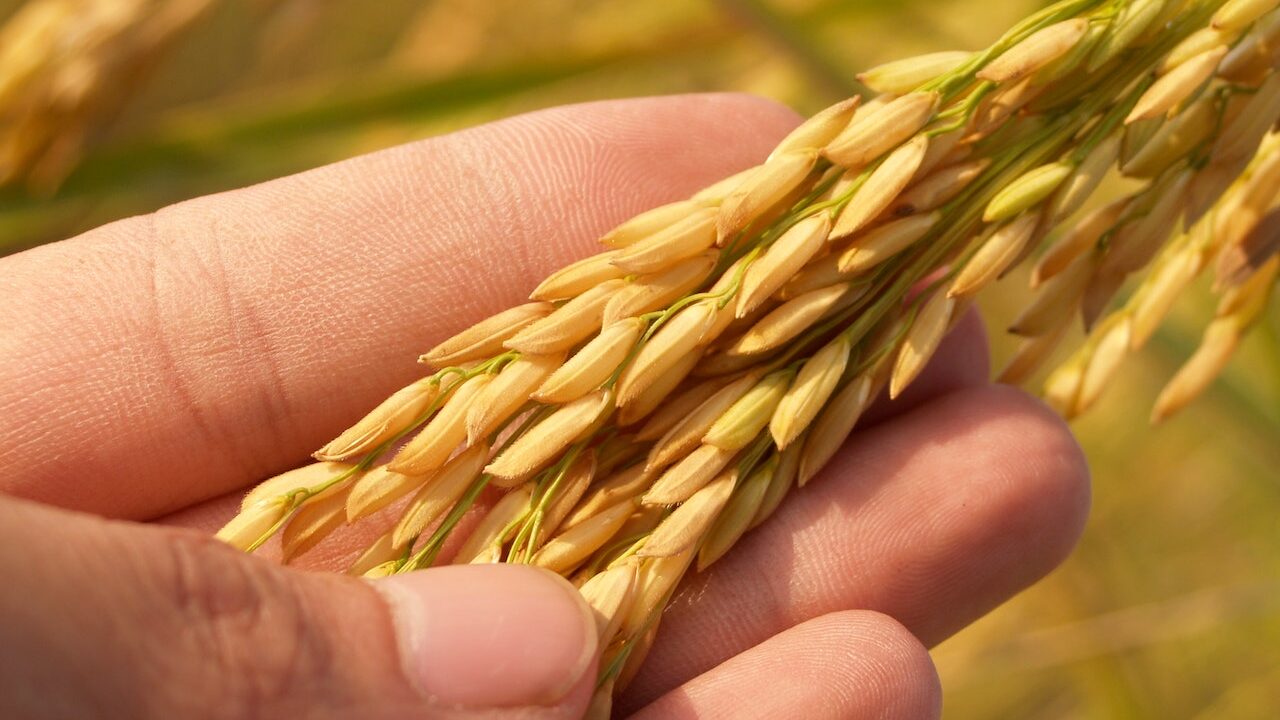
Complete Protein
While brown rice protein is not a complete protein on its own, it can become complete when combined with complementary protein sources. Pairing it with foods like beans or quinoa can ensure you get all essential amino acids.
Easily Digestible
Brown rice protein is gentle on the digestive system and is unlikely to cause discomfort or bloating, which can be associated with other protein sources.
Low in Fat and Sodium
Brown rice protein is naturally low in fat and sodium, making it a suitable option for people on low-fat or low-sodium diets.
Vegan and Vegetarian-Friendly
Brown rice protein aligns with plant-based diets, making it a preferred choice for vegans and vegetarians looking to meet their protein needs.
Sustainable Crop
Rice is a widely cultivated and sustainable crop, which can contribute to environmentally friendly food choices.
Rich in BCAAs
Brown rice protein contains branched-chain amino acids (BCAAs), particularly leucine, which considerd essential for muscle growth and repair.
While brown rice protein may not be a complete protein source on its own, its versatility and hypoallergenic nature make it a valuable addition to various dietary plans. By combining it with other complementary protein sources, you can ensure you’re getting a well-rounded amino acid profile.
7. Mixed plant proteins
Mixed plant proteins, as the name suggests, involve combining multiple plant-based protein sources to create a well-rounded and complete amino acid profile. This approach is often used in plant-based protein supplements and can offer several advantages:
Comprehensive Amino Acid Profile
Blending various plant protein sources, such as pea, hemp, brown rice, mixed plant proteins can provide a wide range of essential amino acids. Which helps address the potential amino acid deficiencies in individual plant protein sources.
Improved Digestibility
Mixing different plant proteins can enhance digestibility and reduce the chances of digestive discomfort that some people may experience with a single protein source.
Enhanced Flavor and Texture
Combining different plant proteins, can result in a more appealing flavor and texture when compared to single-source proteins. That can make mixed plant protein supplements more enjoyable to consume.
Versatility
Mixed plant protein supplements can be tailored to suit specific dietary preferences, including vegan, vegetarian, gluten-free, and allergen-free diets.
Nutrient Variety
In addition to protein, mixed plant protein supplements may contain a variety of nutrients from the different plant sources, such as fiber, vitamins, and minerals.
Sustainable and Ethical
Plant-based protein sources are often considered more sustainable and ethical than animal-based sources, aligning with environmentally conscious and animal welfare-oriented choices.
When opting for mixed plant protein supplements, it’s essential to choose products from reputable brands that transparently disclose their ingredient sources and protein profiles to ensure that you’re getting a high-quality product with the desired nutritional benefits.
Do You Need Protein Powder?
Protein powders can be a convenient and effective way to supplement your protein intake, but they are not a necessity for everyone. Whether or not you need protein powder depends on your individual dietary preferences, lifestyle, and fitness goals.
When You Might Consider Protein Powder:
- Athletes and Bodybuilders: Individuals who engage in intense physical training and require higher protein intake for muscle recovery and growth may benefit from protein powder.
- Vegans and Vegetarians: Plant-based diets may sometimes lack adequate protein, making protein powder a valuable addition for those following vegan or vegetarian lifestyles.
- Convenience Seekers: Protein powders can be convenient for on-the-go or post-workout nutrition when preparing whole food sources of protein is impractical.
- Individuals with Special Dietary Needs: People with dietary restrictions, allergies, or sensitivities can use protein powders as a safe and suitable protein source.
When You Might Not Need Protein Powder:
- Balanced Diet Adequate in Protein: If your daily diet already provides sufficient protein to meet your nutritional needs, additional protein supplementation may not be necessary.
- Preference for Whole Foods: Some individuals prefer obtaining their nutrients from whole, unprocessed foods and may not find protein powder aligning with their dietary choices.
- Limited Fitness Goals: If your fitness goals are moderate or you’re not engaged in intense physical activities, you may not require protein powder.
- Medical Conditions: Individuals with specific medical conditions should consult a healthcare professional before adding supplements to their diet.
In summary, protein powder can be a valuable tool for meeting protein requirements, but it should complement a well-rounded and balanced diet. Your decision to use protein powder should align with your individual needs, dietary choices, and fitness goals.
Which protein powders are best?
- Whey Protein: Whey protein, particularly whey isolate or whey hydrolysate, is a top choice for athletes and bodybuilders due to its rapid absorption and high-quality protein content. It’s ideal for post-workout recovery.
- Mixed Plant Proteins: For vegans and vegetarians engaged in regular exercise, mixed plant protein blends can provide a complete amino acid profile to support muscle growth and repair.
2. For Sensitive Stomachs:
- Egg Protein: Egg protein is gentle on the digestive system and an excellent option for people with sensitive stomachs. It’s also a complete protein source.
- Brown Rice Protein: Brown rice protein is hypoallergenic and well-tolerated by many individuals, making it suitable for those with digestive sensitivities.
3. For Vegans and Vegetarians:
- Pea Protein: Pea protein is a popular choice for vegans and vegetarians as it’s complete and offers a good balance of amino acids. It’s also allergen-friendly.
- Hemp Protein: Hemp protein is a great plant-based option, rich in essential fatty acids, fiber, and protein. It’s suitable for those following vegan diets.
Remember to consider your specific dietary requirements, taste preferences, and any allergies or sensitivities when choosing a protein powder. It’s essential to look for products from reputable brands that undergo quality testing to ensure purity and effectiveness.
In conclusion, the best protein powder for you depends on your unique needs and goals. By selecting the right protein source, you can optimize your nutritional intake to support your overall health and fitness goals.
Conclusion
In this comprehensive guide, we explored the seven best types of protein powder, each offering distinct benefits for a wide range of dietary preferences and fitness goals. Whether you’re an athlete seeking rapid recovery, a vegan looking to meet protein needs, or someone with diet sensitivities, there’s a protein powder that suits your requirements.
Remember that protein powder is a convenient supplement but not a necessity for everyone. The decision to incorporate it into your diet should align with your individual needs and objectives. Choose high-quality products from trusted brands, and always maintain a balanced and nutritious diet to achieve your health and fitness goals effectively.
Sources
- https://www.heartfoundation.org.au/bundles/healthy-living-and-eating/fats-oils-and-heart-health
